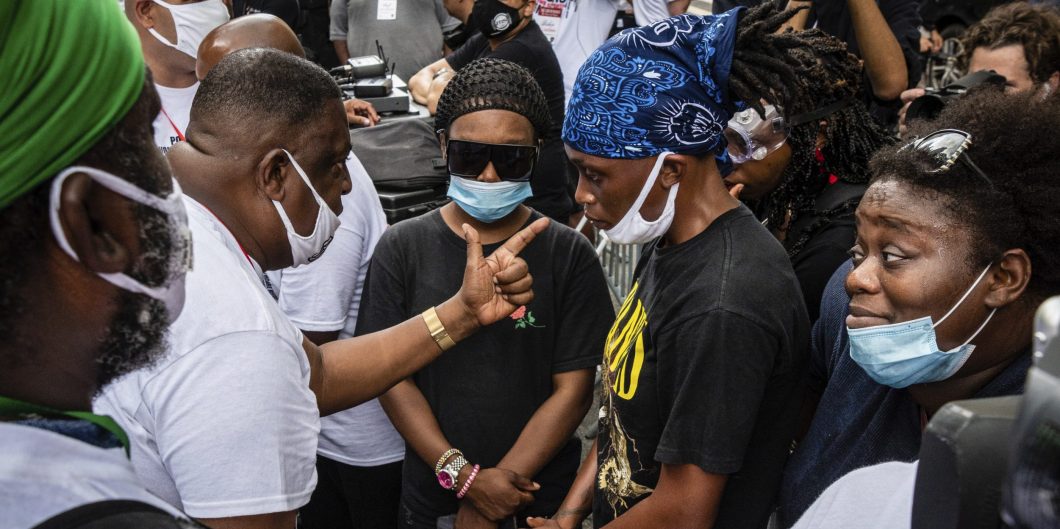Civic Friendship and the War Metaphor
Why should a warrior be civil? Warriors usually enforce the aims of war, up to and including extermination. Social justice warriors are, momentarily, on top: they literally rule the streets, pulling down statues of figures like Columbus. As a conservative warrior requesting civility, Professor Elizabeth Corey is like the vanquished begging the victor for mercy. Progressives feel their strength: this is their hour, why be civil? And we must ask ourselves: Would conservatives be civil, if roles were reversed? The Uncivilian-in-Chief considers himself conservative and might be said to have pushed us all into open warfare. Certainly, his incivility has exacerbated the fighting. The motivation-gap looms large in this account.
Is Prof. Corey civil? Civility would begin by ignoring (not repeating) the excesses of one’s opponents. Civility would especially ignore what one’s opponents said on Twitter. Civility would furthermore not quote out of context. Prof. Corey flunks these tests. She begins with a Twitter quote, despite recognizing that Twitter is “the most uncivil of all digital platforms.” Well, then what is the worth of a remark made on Twitter? Is it really typical of her opponents’ thoughts? Or is it merely typical of what people say on Twitter? To recycle such excesses stokes outrage in the hearts of one’s own side, alleviating the need to say much for ourselves, since the outrageousness of the other side is ‘nuff said. She quotes out of context from Toni Morrison’s 1993 Nobel acceptance speech. The laureate’s point was essentially one also made by George Orwell: language can be abused by the powerful to prevent “the mutual exchange of ideas.” Who would deny it? The word “conservative” does not appear in the dead poet’s text. That text is concerned about racist language and sexist language, among others. What is troubling about that? Did the dead poet champion the speech-codes that grew up in universities? I don’t know. Not on the evidence of this Nobel speech. Such cherry-picking of opponents’ words has become a journalistic reflex. “What will outrage my readership the most?” the writer wonders, “we have to start with a bang.” This reflex is not conducive to civility. Perhaps, however, a plea for civility can still be treated seriously, even if it is not itself civil.
What is civility, that anyone should want it? Civility originally had to do with citizenship: civility was the behavior expected of a citizen. Civility was sometimes contrasted with courtesy, the behavior expected of a courtier. In a monarchy, there are no citizens, only subjects. A subject can be expected to court, or flatter, the monarch. Citizens, by contrast, are equals and thus have no need to flatter one another. Instead of insincerity, bending over backwards to appear gracious, citizens are civil to one another. They don’t pretend to great affection for each other. Instead, they show a certain measured amount of esteem that they would appreciate receiving back. They listen attentively and expect the same in return. They do not flatter, but neither do they insult. To insult would be uncivil. It also would be uncivil to mischaracterize a fellow citizen’s opinion or speech. Fellow citizens can agree to disagree: they disengage before letting themselves degenerate into uncivil behavior: shouting, vituperation. They certainly never lay violent hands on a fellow citizen’s person or property. Destroying public property is, of course, well beyond the pale of good citizenship.
But here again, where is the motivation to come from? Few today seek to improve their citizenship. Citizenship has scarcely more appeal than civility does. Prof. Corey is on to something when she connects civility and love. Love is a great motivator. Love gives us a motive to behave well toward our loved ones. But by this stage in her argument, civility is already pointing beyond itself. The loves toward which it points (charity and family love) are miles beyond civility. Charity is the fulfillment of a far greater and more difficult promise, one that civility perhaps only hints of. Family love is solid enough to serve as a basis: families are the “schools” in which civility can be taught and learned. But as she knows, the decline of family and faith—that is, the decline both of the basis and the fulfillment, alpha and omega—leave civility strung out between two vanishing poles, baseless and without a telos. Besides that, the “modes of life to which civility points are not themselves political.” Don’t we need, then, a political love—a political motivator? The political motivator Prof. Corey is looking for is civic friendship, understood not as a moral ideal but as an empirical truth about our society.
Conservatives believe progressives are seeking regime-change, a war aim. Progressives believe Trump has declared war on the Constitution. But each of these figures of speech is warlike metaphor, not true war.
Where is this political motivator, civic friendship? Though she restricts love to families, the motivating love which Prof. Corey finds in families exists in larger associations, too. It is merely the case that civic friendship is weaker and more diffuse, less obvious a motivator than family love. Americans still react with sympathy and sometimes outrage, for example, at the stories of fellow Americans whose jobs have been outsourced. Americans esteem Americans more highly than we do foreigners—despite the morality that tells us we should be good internationalists. Just as the family is a “civil association,” a “kind of little society” that desires to stay together rather than fracture, so the national union is a civil association and a kind of giant family that desires to stay together rather than fracture. Proof? For most Americans, the union remains more important than any debate that would divide it. It was this sort of valuation that prevented Lincoln from being an abolitionist. Presentism’s case against him is that Lincoln gave the union precedence even over ending slavery. Purer positions existed, such as the slogan of the Garrisonian abolitionists, “No Union with Slaveholders.” But as Frederick Douglass pointed out, to dissolve the union would be to lay down the numerical advantage of the Northern states in abolishing slavery under the Constitution. The union has advantages even when our self-righteousness blinds us to it.
What about the union today: Does it still take precedence? Do we esteem each other—and our union—sufficiently to stay together? Another way of asking the question: Are we really at war? Conservatives believe progressives are seeking regime-change, a war aim. Progressives believe Trump has declared war on the Constitution. But each of these figures of speech is warlike metaphor, not true war. We are not in war-time. Both sides actually prefer the union and give it precedence over any issue that divides it. Even our agreement on the regime—the ultimate basis for citizen’s esteem for their fellow citizen—remains strong enough today. To cite just a few heartening examples: progressives realized early in the Trump administration that they still love the Constitution, just as they rediscovered the goodness of localism and states’ rights, in their various attempts to resist his policies. Conservatives, too, have been forced by populism to esteem the blue-collar citizen again. Only our partisan attitudes of no-compromise prevent us from seeing how much common ground there actually is.
None of which is to deny that we stand near a precipice. The armed presence of antifa and militia members at protests is a disturbing omen, suggesting that ordinary citizens, too, could someday begin to prefer disunion with their hated brethren, separation in all its moral and ideological purity, just as the Garrisonians wanted. Hegel called a related attitude, or mode of consciousness, “the beautiful soul.” Its siren-song is perennial; only the specifics change: “Perhaps the murder rate did skyrocket after we agitated to defund the police, but at least my heart was in the right place.” “Maybe excessive use of force did continue against black suspects, but at least I supported our men in blue.” Such narcissisms are luxuries we cannot afford today because they bring us closer to war.
“Harsh are the wars of brothers,” Aristotle said. But he said it in proof of his theory that love and anger are related. We get angrier when friends and loved ones disrespect us than when strangers do. Why? Because love comes from the same faculty of soul as anger, the spirited faculty. Enemies like Putin we can hate (a cold emotion), but the anger we feel in the present moment is a hot emotion directed at our fellow citizens: it is indicative of in-house strife. We couldn’t feel it unless we had felt a prior love, a love that was betrayed. This love is our civic friendship, and it is an important motivator of good citizenship and, yes, civility.
Progressives and libertarian economists alike forgot about civic friendship during the heyday of internationalism and globalization. Trump taught us to know ourselves better. White conservatives of various stripes, too, have forgotten about the civic friendship we share with black Americans, at least those stuck in high crime areas. Do we conservatives have the humility to be taught it now, at the hands of Marxists and other unworthy opponents, so that we can forge our own ways of knowing and saying that our black brothers’ and sisters’ lives matter to us?


